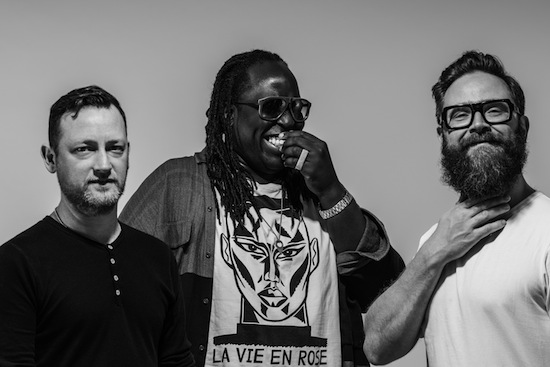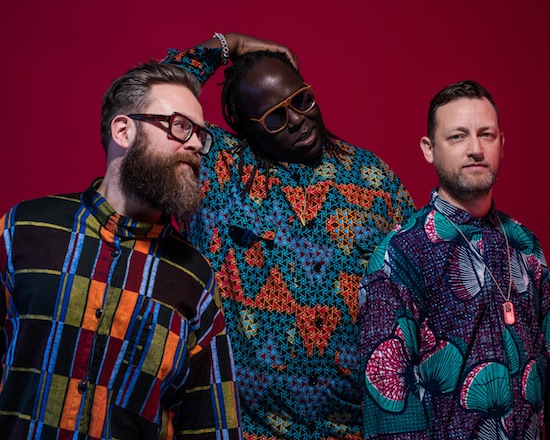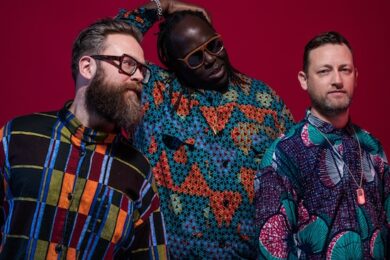“An old friend of mine once said to me that there will be one defining event in your life. It will probably be a traumatic event, and it will divide your life into two. It could happen when you’re eight years old or when you’re 40, but the second half is always lived through the prism of that experience.” There’s little doubt where the division lies in the life of Dave Okumu.
On May 17, 2012, his band The Invisible were performing in Lagos, Nigeria, as part of a concert organised by the British Arts Council. Okumu’s bass hadn’t been properly earthed and the current began burning into his open palms, and as the unadulterated force of electricity tried to find its way to the ground it surged through his right leg, causing the muscles to contract so violently that it shattered his bone into pieces, nearly killing him in the process. “I couldn’t speak, this primordial sound came out of my mouth, and then I started to see loved ones. It was like flicking through a photo album like I was trying to see them all for the last time. I wondered whether this was what the electric chair was like, and then just thinking ‘if this carries on for any longer, I’m not going to make it.’”
His bandmate Tom Herbert broke the circuit by knocking the instrument from his hands. Had he not acted his frontman would almost certainly have been killed, yet the traumatic effects of that day are still lasting four years on. Okumu is highly likely to develop premature arthritis as a result of the injury to his leg, which required the insertion of metal pins over a number of operations, and immediately after our interview at the Velo bike repair store and cafe in his native Deptford he leaves for his doctor to request his medical records.
The immediate aftermath in Lagos was chaos, traumatic too for Herbert and fellow bandmate Leo Taylor, even more so for the fact that less than a month after the incident the band’s second record Rispah was released, itself a deeply emotional work that followed the hugely impactful death of Okumu’s mother for whom it was named. “It was a time when you might want to hide away and be private but we had an album coming out and everyone wanted to speak to us,” he remembers. “It was incredibly traumatic and the most physically painful experiences I’ve had, but it also had a huge rippling effect on Tom and Leo who had to see me go through that and effectively save my life. Our future as a band was thrown into disarray, there were legal implications, and they had to get me out of Lagos under extremely difficult circumstances. I think in some ways it was worse for them because they had to go through a secondary trauma; an emotional trauma without a physical manifestation of, ‘You broke a leg.’”
Yet as the bass was pulled away and Okumu fell to the stage floor that day in Lagos, he let out a laugh. “It wasn’t a normal laugh but a laugh from deep in my spirit. I didn’t die; I was snatched away when it was all going one way,” he says. “It was the laugh of victory.” In the end, that most painful period of the band’s existence was a transformative one. “Losing my mum and then soon afterwards nearly losing my own life, has completely changed the way I look at life. There’s a moment in one of Martin Luther King’s addresses just urging his listeners to remember that their suffering is legitimate when it’s redemptive. I feel like it’s something that isn’t spoken about very openly in our culture, but I do think that if we are able to confront and transcend difficult things in our lives they take on a value that’s incredibly precious.”
That it took such a team effort to steer the band through troublesome times, too, has only strengthened their already considerable resolve. “I didn’t think we could get much closer. There’s something about passing through difficulty together, it’s the making of human relationships. If you know you can deal with something together as a unit where communication isn’t compromised, that’s just it for me, it’s the pinnacle of human existence.”
If their superb new record Patience is anything to go by, The Invisible have indeed after four years emerged utterly triumphant. It is, as Okumu describes it, their most joyful work to date, flush with smooth mid-tempo grooves and iridescent funk, yet still a deep, complex record to unravel. It is not, he points out, merely a vapid, ‘happy’ record. “Happiness feels sort of transient, more emotional, but I think there’s something more profound going on for me [on this album]. The way that’s manifested is an exploration of a tone, a colour in our music. We’ve brought in another palette, earthy, sun-drenched orange and dusty pinks, and everything that comes with those feelings of warmth and acceptance.”
It’s been a long time in the making. Following his leg break, there was a period of recovery where Okumu was unable to work; a frustrating experience, yet in retrospect a deeply valuable one. “I would love it if I hadn’t broken my leg,” he says, “but I can see that very painful experience has been transformed into something positive. That time of convalescence and physical healing also became a time of great emotional healing. It’s something I’m strangely grateful for. If I’d not broken my leg we would have been touring straight afterwards. I would have found it very difficult to process had I not had something that made me just stop and take a minute to absorb what happened.”
Though it was “crushing” not to be able to tour their second record in the weeks that followed, because he had to remain as physically still as possible Okumu’s creativity was pooled into production and writing for other artists, while discussions among The Invisible as to their next step went on. “We’d dealt with so much stuff making that second record and I didn’t feel like there was much deeper we could go, then after what happened in Lagos we had another phase of going deeper, just the three of us. I remember us talking about wanting to express hopeful and joyful things in our music, and it’s really interesting how you can almost pre-empt things. There’s something quite affirming about that, it tells me we’re on our own path.”
With the disappointment of not being able to fully promote Rispah in mind, the band were eager to keep things moving on its follow-up as quickly as possible, but found it “challenging to carve out the space with all the other things we were doing. London has always been this really fertile, exciting environment for me, but there’s a lot of grind, a lot of pressure. I began to wonder where I was going to find the space to actually make another record.”
It was two years later that Okumu found relief in Los Angeles, where Patience was written, having ended a tour with Jessie Ware there. On the West Coast he sought solace from London’s constant grinds and pressures, and a chance to “disappear”. “I’m a real believer as a producer that the structure you create around something defines the quality of what it is. I really think the best creativity comes from a free, almost childlike, playful space. If you’re feeling pressurised you won’t come up with your best stuff.”
There, with a distinct proviso not to get drawn into sessions, “just to find somewhere nice to stay and hide for a bit, and see what happens,” Okumu spent his time on long drives around the state with his cousin Bobby, who lives in the city. “At that time I’d never really connected massively with LA, I was much more into New York, but on these drives I just found that I was loving the climate, the expanse, the topography; the range of stuff that is available to you when you know where to look, there was something really liberating about that. We’d go to Venice Beach and I’d make a beat about that, and that feeling saturated the whole process. It was interesting to see what an effect a place can have on the sound. Everything just slotted into a different space for me.”
He also bumped into the likes of Laura Marling, Willy Mason and Orlando Higginbottom of Totally Enormous Extinct Dinosaurs, “friends who were in a similar frame of mind. I was just running into these people on the street and having really great conversations. It felt like a very different energy to the creative anxiety that’s palpable in, say Hackney.” It was the first time in a multi-faceted career that he was able to focus entirely on his own writing, and soon found that “when the conditions were right I was tripping over myself with what I wanted to say and how I wanted so say it.”
The atmosphere of a city in the midst of what Okumu calls “a renaissance, musically, artistically and creatively,” bears its influence on Patience too, the record’s unabashed riffs of synth imported straight from the thriving LA beat scene. “By osmosis I’d noticed something happening. Your environment effects your work whether you’re conscious of it or not. I suddenly found it very comfortable writing songs at a hip-hop tempo, I’ve always loved that music but being in LA did something to the glue of how those things came together.”
The final product, even against the sublime claustrophobia of their self-titled debut and the monumental Rispah, is perhaps The Invisible’s finest work yet, proof indeed that their suffering has been worthwhile. It’s also, given the events in Nigeria, the first time they’ve toured a new record since 2009. It feels, Okumu says, like rebirth. “It taps into something I’m always looking for, the sense that I’m beginning again. It’s strange to say, but in a weird way I want to feel like a beginner, because that’s when you’re really learning. When you’re out of your comfort zone, knowing you’re starting something, life is all about possibility. I think that’s what the creative spirit yearns for, I always think it’s amazing when you find a career artist who’s still making great music, the fact Bowie could keep making great records in the way that he did.
“Obviously I know what it feels like to do a festival now or whatever, but it’s amazing to look round at Tom and Leo and it feels like we’re babies again in a really positive way, that side of it is exciting to me. As Joe Strummer said, ‘the future is unwritten,’ I love that. I don’t know how many gigs I’ve done over the years, too many to count, but that’s why performing is still so exciting to me, it’s about the unknown. You don’t know what’s going to happen in a room, how people are gonna respond, whether you’re gonna connect or not, how you’re gonna fight all the way through, whether all your gear’s going to break down and you’ll have to find another way of saying what you’re meant to say. It’s about risks, and I don’t ever want to be someone who stops taking risks.”

There is, however, another less glamorous risk Okumu is about to take, of speaking out on an uncomfortable topic for most of his fellow artists. As a barista steals an edgy frown at my coffee barely touched for over an hour, I ask if there’s anything he’d like to add as we wrap up our conversation. “It’s nice to be given that space…” he ponders, his eyes squinting in contemplation behind his dark glasses. “There is something I’ve been thinking about a lot,” he finds after a long pause. “It’s about people buying records, the conversation that’s not happening around that. As I embark on this process of promoting this record, being right at the interface of this uncomfortable marriage of art and commerce, it’s got me thinking.”
The problem, Okumu says, is that though thanks to streaming music arguably has more currency within culture than it has ever done, creatives suffer more than ever from the devaluation of their work. “We’re existing in this time where there’s an absence of engagement. I feel like it would make a real difference if people were able to be articulate about what the process of being an artist is like, where you put out a record and in the first week you might have hundreds of thousands of streams yet no one buys that music. I’ve been trying to think of metaphors for that and in a way it’s the ultimate backhanded compliment, like someone saying ‘you’re really sexy, but I don’t want to go out with you’.”
Yet for a vague, outdated fear of ‘selling out’, the conversation simply isn’t happening. “I think people feel like it’s crass, like you’re trying to pressure someone, but actually I do want to say ‘buy my record’, I want to say ‘buy my record for these reasons’. If you don’t value what I’m doing, fine, walk away and don’t support it, but don’t say ‘I think what you’re doing’s cool’ and then not support it. It’s about commitment, and commitment is so absent from our culture. We’re encouraged to procrastinate and to hold lots of choices, but to say ‘I believe in something and I’ll get behind it,’ there’s such enormous value to that.
“I don’t want to have that conversation that I’ve been having for years, when people say mainstream music is shit. If you want things to come through in mainstream culture, support them, it’s as simple as that. I don’t feel the need to portray myself as anything other than I already am, which is somebody who’s very lucky to have a creative life which I’m here to sustain because I think it has value for me and other people. It’s not because I think I’m more important than anyone else, or because I want to be famous and make loads of money, I just want to do what I think I can do best on this earth, which is make stuff.”
The solution, for now, is self-sufficiency, building the right communities of like-minded creatives to support one another as musicians, using each other to try to find the space and time to properly hone their craft. “I think there’s a different relationship to process in this day and age, and it’s almost like process isn’t seen as valid because everything moves so quickly, there’s so much stuff. You could go home now and make something with music software that sounds like a real track in no time. That has no value as music if that’s coming at the expense of connection to something deeper.”
As an optimist, Okumu maintains that things have to get better, that eventually artists will find some form of remuneration amid the dominance of streaming subscriptions, but not if the conversation isn’t happening; if artists keep accepting the status quo. “I’m trying to make that commitment to myself not to shy away, which would be really easy for someone like me; not a finger wagging person. Models will change, they have to, but being in this place as an artist where you think, ‘Shit, I’ve just got to weather this storm’, is quite frightening for a lot of people. I think being in touch with the fact that you have a choice as a human being is so important.
“As grim as things may feel, you still have a choice about how you prioritise your time, whether or not you engage with what you’re inspired by. Inspiration is a transformative power, when you feel inspired by something you open up and flourish, and you can do that just by looking, opening your ears and searching. I just want to find a freer and more open way of having that conversation…
"Anyway,” he laughs, “that’s my parting shot!”




